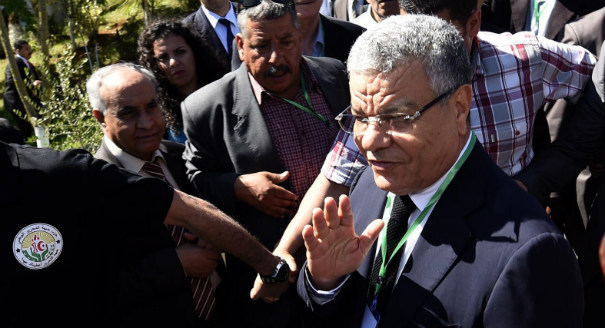On May 14, President Abdelaziz Bouteflika appointed new ministers in the largest cabinet reshuffle in three years. Over ten ministers were asked to leave Abdelmalek Sellal’s government, including several appointed only last year. Most significantly, the ministers of interior affairs, finance, and energy were replaced. But although almost a third of the corruption-riddled cabinet has been changed, still the new appointments fall short of the significant change Amar Saadani, the Secretary-General of the ruling National Liberation Front (FLN), announced earlier this year.
These recent appointments indicate the government’s attempt to divert public focus away from a range of issues Bouteflika and his associates view as a threat, particularly transparency and Bouteflika’s failing health. Since he suffered a stroke in 2013, there has been serious doubt and speculation about his ability to govern. The Bouteflika clan alleges that his intellectual capacities are intact and that he continues to govern, but Algerians are unsure who runs their country. Furthermore, opposition parties are demanding his departure from office and calling for early elections.
In response to growing criticisms on these two fronts, the office of the president, which carried out the reshuffle, made three noteworthy cabinet changes. First is the replacement of Tayeb Belaiz, the Minister of Interior and Local Government, with Noureddine Bedoui, previously Minister of Education and Professional Training and a native of southern Algeria. Belaiz was made Minister of State, Special Advisor to the President of the Republic. Observers speculate that this move was to ensure Belaiz is well-poised to become a potential successor to Bouteflika. Secondly, Energy Minister Youcef Yousfi, who has drawn much criticism for his handling of the southern protests against the exploration of shale gas in In Salah and the various corruption scandals plaguing Sonatrach, was replaced by Salah Khebri, previously the chief executive officer of the Algerian Petroleum Institute (IAP). Third is the replacement of Finance Minister Mohamed Djellab with Abderrahmane Benkhelfa, the director-general of the Association of Banks and Financial Institutions (ABEF).
On the surface, these personnel adjustments signal the government’s desire to reform these sectors amid persistently low oil prices. Indeed, the government has tried to ration public expenditures and introduce austerity measures while also struggling to attract more foreign companies to its energy sector to help offset declining oil and gas production. But ongoing and high-profile corruption trials in the energy sector have caused Algeria’s political class to remain skeptical about whether the government is capable of reforming itself at all. They view the reshuffle as a politically convenient measure to sack ministers involved in recent corruption trials while ensuring the cabinet remains loyal to the Bouteflika clan.
Beyond these three ministerial changes, the new government appointments also include Finance Minister Abderrahmane Benkhelfa, Transport Minister Boudjema Talai, and Public Works Minister Abdelkader Ouali, as well as new culture, telecommunications, and higher education ministers. Most of these adjustments replace ministers involved in the recent corruption trials. Former Energy Minister Youcef Yousfi—in addition to other former government officials, business executives, and foreign companies—was implicated in corruption charges for ongoing Sonatrach trials. Likewise, recent verdicts on embezzlement scandals surrounding the East-West highway and the Khalifa Bank have implicated other high-profile former government figures—including former Labor Minister Aboudjerra Soltani and current Housing Minister Abdelmadjid Tebboune, among others in the finance, transportation, and public works ministries.
Although the Algerian presidency has previously weathered such scandals, the struggle for dominance between the Department of Intelligence and Security (DRS), the army, and the presidency continues. Although the DRS used to dominate the country’s political arena, its authoritarian tendencies have caused it to fall out of favor with political parties and civil society organizations, and it increasingly losing control of the decision-making process. Adding to the uncertainty, it frequently clashes with the Bouteflika clan, which continues its own heavy-handed approach in dealing with the opposition—including restricting the freedom of speech and press, as well as jailing dissidents—that is leading to more popular discontent. Examples of this struggle include the DRS-led media focus on the Sonatrach and highway scandals, part of its ongoing attempt to blackmail the presidency. This has left the Bouteflika clan no option but to sacrifice implicated ministers to avert a popular backlash against the state.
As part of their attempts to keep an upper hand over DRS, the presidency is also pursuing a longer term plan by co-opting political parties and buying the loyalty of Algerian civil society organizations putting the DRS on the defensive. In response they too are expanding their alliances within political parties and civil society groups. The recent resignation of Abdelkader Bensaleh from the National Rally for Democracy (RND) could pave the way for DRS ally Ahmed Ouyahia to reassume party leadership.
The presidency is acutely aware that Algerian society has become more conscious of its shortcomings and weaknesses, and that active youth and other forms of political opposition can pose a direct challenge to the regime. And these superficial attempts to show action on question of succession, to take on limited anti-corruption efforts, and to co-opt civil society will increasingly lose their ability to distract Algerians from the state’s significant structural problems.
Abdallah Brahimi is an alumni fellow of the Maxwell School of Syracuse University and a freelance consultant for Algerian NGOs.



.jpg)


